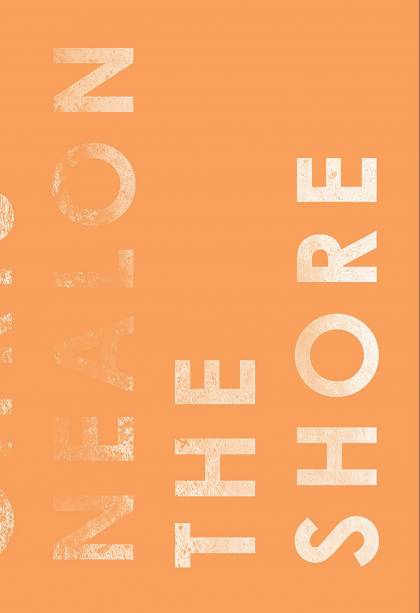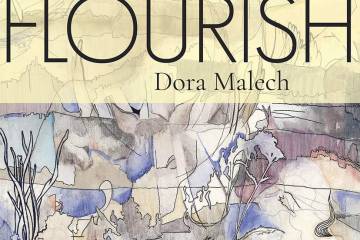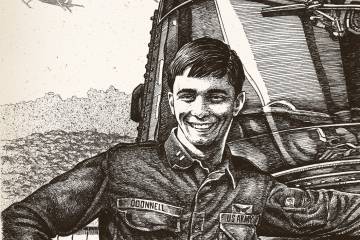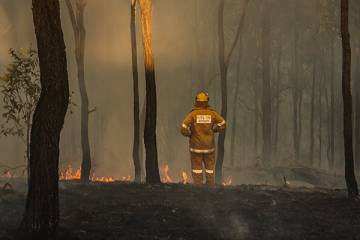Johns Hopkins English professor and poet Chris Nealon keeps a notebook the way a visual artist might maintain a sketchbook. It's a place to jot down and work out ideas. It also includes notes to himself, those asides that can have the potency of a revelation. One reads, "I wasn't expecting to grow up to be the angel of death," Nealon says, and immediately laughs. He's getting older, his and his husband's young son started school, and he's wondering what the future holds for the next generation. He mentions that he realized he was writing a form of elegy in his last poetry collection, Heteronomy. And he adds that even familiar books he teaches—such as Thomas Pynchon's Against the Day, which includes a fair amount about the living and the dead—felt different discussing them this year.

"I thought I was going to be the fun, hang-out-at-a-party guy, but that's where I'm headed," Nealon continues, still laughing. "I hope it isn't a bummer."
The Shore (Wave Books, 2020), Nealon's most recent collection, isn't a bummer, even though it's both a companion to Heteronomy's elegies and strewn throughout with some of Nealon's more intense imagery. Its five long-form poems wrestle with such politically volatile subjects as masculinity, race, sexuality, gender identity, class, and the 22nd century. The poems are also dotted with funny observations—"resting cop face / resting banker face"—moments of touching vulnerability, and more than a few belly laughs. And though written between 2015 and 2019, they feel eerily prophetic. The title poem, a 10-page meditation on capitalism, moves from reflecting on the shore as "the outline of the body of the sea" onto thoughts of how poets described everyday stress, such as Wallace Stevens' "the pressure of reality." The poem eventually alights on the people who may be the greatest asset in undermining how our neoliberal economy turns radiant cities into hellscapes: the nurses, the "drivers who supply Whole Foods," the EMTs—workers we've come to know as essential.
Such explorations of everyday life may not initially read or feel like plaintive poems, but Nealon points out that the form is broader than we imagine. "In English-language poetry we think of an elegy as for a very specific person," he says, referring to examples such as John Milton's "Lycidas" for a friend who drowned or Alfred, Lord Tennyson's "In Memoriam A.H.H." for a friend who died of a stroke at 22. Nealon mentions how in German poetry an elegy can be as simple as a poem that takes a snapshot of the way people live at a certain moment in time, not solely a lament or somber reflection.
After Heteronomy was published in 2014, Nealon felt he wasn't finished exploring this form. "There are a lot of addresses to folks who have died during the course of the last five years in these poems," Nealon says of The Shore. "They're dedicated in some cases to those people. But I also wanted to think about the German tradition as a thing that mixes tones. I wanted there to be humor in all the poems. To me, elegy includes those things because you care more about the loss you experienced when you see that the person who's been lost and the person describing it have the ability to experience joy."
That effort is most identifiable in "White Meadows," a poem in which Nealon remembers his friend Patrick Baroch, an artist, filmmaker, and television producer who died in 2014. Nealon recalls Baroch filming him reading his poem "The Dial" in a Seattle coffee shop, adding that "I couldn't tell you exactly how his whiteness was different from mine, just as his queerness was." It's a crushingly tender admission in a poem that explores how whiteness as an identity, and its corresponding American dream, involves realizing "that your whole life was built, as your parents' lives were, on the backs of others elsewhere." \
"The Victorious Ones," The Shore's most potent entry, is a 22-page poem broken into 17 compact sections where Nealon meditates on myths, heroes, and the chance that his son may see the dawn of the 22nd century. It opens the collection and has the same mood-setting effect as the Rolling Stones making "Gimme Shelter," the lead track on Let It Bleed. It's at once powerfully apocalyptic, accessibly compelling, and disarmingly intimate.
The poem is "about the role of myths in our lives, including myths of apocalypse—floods, plagues, destruction by fire," Nealon says, though his ideas of heroic figures aren't shaped by the ancient Greek gods often found in poetic allusion. "My sense of the amplification of the self into the heroic comes from cheesy '70s science fiction, lightsabers, and Obi-Wan Kenobi."
"But then I also found myself interested in how we constantly demystify and re-mystify ourselves every day," Nealon continues, talking about how there's a daily rhythm to our kidding ourselves and snapping out of it. "So I was trying to think about the way we approach vast historical change through this funny combination of reaching for old mythic narratives, which have their use, but also by shaking the droplets out of our hair and saying, Wake up, and take a look around you. Because I don't know what the hell is going to happen, I'm just trying to name the terrain. And when I close my eyes and think of big stuff, I often think of the heroes from when I was 7 years old, but I also think of who I'm with right now."
Posted in Arts+Culture
Tagged poetry, english, book review, new releases, summer reads 2020












